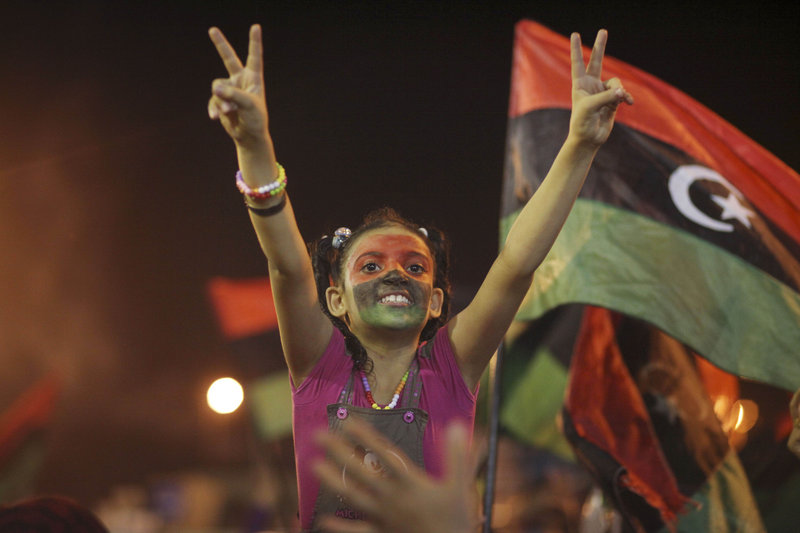You’d think everyone would have learned a long time ago that it can be embarrassing, not to mention dangerous, to declare “mission accomplished” before the mission is actually accomplished. Just ask a former president of the United States, who may never live down his endorsement of just such a pronouncement following the invasion of Iraq.
Even so, Libyan rebels and the international media couldn’t stop themselves from celebrating the overthrow of Libya’s longtime dictator, Moammar Gadhafi, on Tuesday even though he hadn’t been officially overthrown.
As of Friday afternoon, Gadhafi was still missing and apparently at large as rebels rummaged through his compound in Tripoli. Gadhafi clearly left in a hurry, leaving behind many official documents and even his secret stash of Condoleezza Rice photos. The creepy Libyan tyrant evidently harbored lust in his heart for the former U.S. secretary of state.
While rebels searched for Gadhafi, bloody fighting continued in some of his remaining strongholds, and forces loyal to the displaced leader were still generating episodic havoc in portions of Tripoli.
The anti-Gadhafi revolution had clearly succeeded, but there were loose ends that had to be attended to — most notably the capture or killing of Gadhafi. Once he’s secured, or buried, then by all means the mission-accomplished banners can go up and the dancing in the streets can begin.
Meanwhile, it’s worth pondering the significance of Gadhafi’s downfall in the context of the Middle East’s “Arab spring,” which now has surged through the summer and figures to stretch into the fall as Syrian President Bashar Assad desperately resists efforts to end his reign of terror.
With entrenched rulers such as Gadhafi and Egyptian President Hosni Mubarak swept aside and Assad under siege, it’s impossible to deny the reality that a region of the world where oppression has been the norm is suddenly a hotbed of revolution.
It is far too soon to draw conclusions about the meaning of these historic developments, or to imagine what will happen next. We know so little about these freedom fighters — their deepest motivations, their hopes, their dreams, their political and ideological loyalties — that any projections about the future they will shape would be pure speculation.
Our greatest fear, of course, is that they will replace the tyranny they fought against with a new brand of oppression that is as bad or even worse. If the governments of these newly liberated countries should fall into the hands of radical Islamists, for example, the world could face a horrifying outbreak of state-driven terrorism, or even a menacing alliance of religion-based oligarchies that could threaten peace and stability not only in the Middle East but around the world.
That’s the dark view.
But it also seems entirely within the realm of possibility that we could be witnessing the emergence of a new Middle East; that we could be seeing the first, tentative steps in an eventual rush toward democracy throughout the area.
The ferocious, near universal desire of oppressed peoples to oust the likes of Gadhafi suggests a craving for liberty and individual expression that historically has led to the establishment of democratic governments and free societies.
Imagine a Middle East where nations and their leaders, rather than shrouding themselves in hostile, militant isolation, engaged each other and the world in pursuit of mutually beneficial political and economic goals.
George W. Bush, the president who prematurely declared victory in the Iraq war, drew widespread scorn for his suggestion that a small spark of liberty could ignite a wildfire of democracy in that part of the world.
And yet the “Arab spring” and the ensuing summer of revolution have cast Bush’s “freedom agenda” in a new light — if not as an instrument of policy then at least as the framework for a hopeful and forward-looking vision of a better world.With entrenched rulers such as Gadhafi and Egyptian President Hosni Mubarak swept aside and Assad under siege, it’s impossible to deny the reality that a region of the world where oppression has been the norm is suddenly a hotbed of revolution.
Copy the Story Link
Send questions/comments to the editors.



Success. Please wait for the page to reload. If the page does not reload within 5 seconds, please refresh the page.
Enter your email and password to access comments.
Hi, to comment on stories you must . This profile is in addition to your subscription and website login.
Already have a commenting profile? .
Invalid username/password.
Please check your email to confirm and complete your registration.
Only subscribers are eligible to post comments. Please subscribe or login first for digital access. Here’s why.
Use the form below to reset your password. When you've submitted your account email, we will send an email with a reset code.